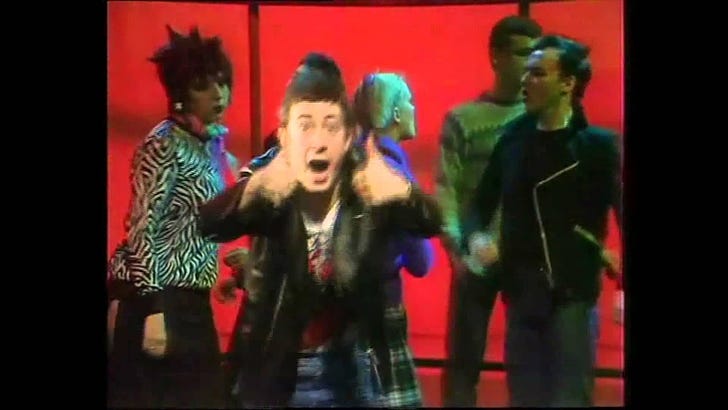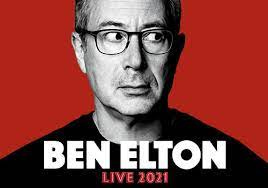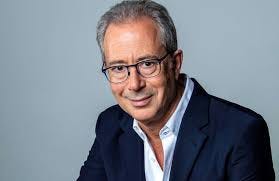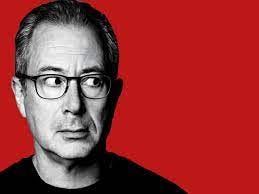I feel like Ben Elton’s work – the very best of it – has been with me my entire life. I watched The Young Ones before I really knew quite what was going on, then when I knew exactly what was going on I I watched it again – and again! Same with the Blackadders. Then there’s the books. Those hilarious early novels that send up various genres, that get very clever very quickly and the page-turning hurtles – to a run of biting satirical works addressing social media and insta-celeb culture (he’s still returning to that as a subject, as his very latest novel shows). But in and around that historical fiction, the stand-up sets – and then one of several rebirths, creator of rock’n’roll musicals, director of films. I mean where do you start when Ben Elton is on the line?
It’s Ben Elton. So you know you’re going to get 45 minutes of content out of your allotted 15. But where to start? I don’t tell him that we met once, briefly, in the green room of a New Zealand TV studio. But I do think about telling him that his 40+ year career has created works nearly as old as me, work that’s been a touchstone through my life.
But I guess (and probably correctly) that Ben Elton gets given that sort of chat all the time. And what can you do with that? A bashful thanks? Plough over the top with a memory of some of the madness that he cultivated? Well, I decide instead to go the safe route. He’s in Canberra as we speak. A couple of weeks into his rescheduled tour dates. A pesky little pandemic stopped most of the world from doing most of its things in 2020. Many of us got to keep breathing though, that’s a bonus.
I’m curious to know why New Zealand has always been an audience for his sporadic live shows – three big comedy tours since the late 1990s and we’ve always made the cut. And like a skilled interviewee he can predict my initial question, pleasantries about the early dates and the early morning phone call are brushed aside in seconds as he bellows happily, “Adding dates, just did three in Sydney and two in Melbourne and it’s going fantastic. Finally back on the road and it’s all in preparation for New Zealand!”
So that is where – and how – we start. How come New Zealand gets the gig? We’re lucky to get a Ben Elton show or two as part of every tour.
“Well, you know, because there's a there's an audience for me in New Zealand. I think any comic always feels – if you feel an obligation, if there's people who want to see you then oh, my god, you know there are performers dreaming of having an audience and here I am, I've got an audience. I better damn well look after it. I mean, I've never been, you know, a big hit in America. So I've never had that. You know, temptation drawing me away. The audience for my comedy tends to be Britain and Ireland and New Zealand and Australia. And so when I saw, I like to play to whoever, and sometimes I've done a few dates in Canada, and a bit in Europe since their English is so good you can do your shown but really my stuff is Britain, Oz and New Zealand. So yeah, and I love coming”. He pauses only briefly, then continues with a chuckle, “I can think of less beautiful countries to come to. I'm looking at for three weeks tour in us in New Zealand. I mean, you know, how lucky am I quite frankly”.
And so this is how it will go. Lob a question – an easy question, a pedestrian bit of PR, hit the dates and places, and Ben will talk. He will also, and watch for it, drop little frustrations – “not a hit in America” – other interviewers have called him on his bitterness, some have also taken him to task for exchanging working class roots and left wing comedy ideals for a seat in the opera box next to Andrew Lloyd Webber – and that’s a way to get him sounding really defensive really quickly, what I’m interested in is the capacity for doing the work, the proficiency and the prolific nature.
But first, a bit more about touring, and how structures his sporadic shows – most comics do the road, then go and write and then hit the road again, maybe recycling a few bits but hoping to return with mostly a new show. Elton takes 10 years off between tours – pumps out a couple of books, develops a new TV show, writes a musical or a play, directs a film, so the work itself never stops. But then he finds himself back in front of an audience. And the world has changed completely. One of his advance publicity lines for this tour is that the last time he was out on stages telling jokes he was smarter than his phone.
“I was away for 15 years in the past, and I’ll always have a new show, I never repeat anything – although in this show there is an element of retrospective but only because I’m looking at a couple of routines I did in the 1980s and how they would be viewed now, so taking a loo at that. That’s quite an interesting part of the show – but it’s all comedy and going well and getting a lot of laughs. But, yeah, a lot has changed and I talk about that, I talk about my bemusement. I started off 40 years ago as a confident young person, you know, ‘young people’s opinions’, there’s nothing stronger than the opinion of a young person! But as you grow older you come to question certain certainties and things are almost a bit more confusing now than when you were young. That’s actually a theme of the show. Kind of, The More I See The Less I Know, things I thought were certain were no longer certain, you know when I was still in the UK, Britain was breaking up. We were leaving Europe. Scotland was leaving England. It looked at one point like we were going to have more genders than countries in the UK – everything was changing so quickly.”
I cut in and tell him this makes him almost unique, that as a 60-year-old white man he’s admitting the older he gets the less he knows.
“Certainly, it’s funny to me. A lot of interviewers, and you haven’t done it yourself yet, will go ‘Ooh, this political correctness, are you finding you’re no longer allowed to say…’ which is completely rubbish, I can say whatever I want to, and continue to do so. But this idea that middle aged white men are somehow losing their voice, that a kind of woke culture is crushing the opinions of middle-aged white men, and that comes from conservative white men…and I think well excuse me, I think well you’ve got Johnson Prime Minister of Britain, Morrison Prime Minister of Australia and Trump recently President of the States I think conservative middle-aged white men are still finding a fucking voice! But I am obviously not a conservative white middle-aged man, although I am a white middle-aged man. And I deal with that, of course I do. I deal with the changing attitudes to that, the dawning realisation of what privilege means and I deal with the shit that’s going on, I’ve always done so and I always will – in as funny a way as I possibly can”. He can go like this for minutes on end barely drawing a breath. We know this from the monologues he writes and delivers. But what you realise when you ask Ben Elton a question is that the reason he is so prolific is because he is always on! I’ve interrupted this transcript to point this out but there was half a breath only during this beat and he’s off again: “I think that comedy is a great art form, a great medium for ideas. I think the more serious and more complicated the stuff you’re talking about the funnier the material can become. Because complexity can be hilarious. And my goodness we live in a complex world”.
Now it’s time to log the question about whether he’s a writer first and foremost.
“Oh, unquestionably. Yeah. And it's not what I see myself as – it’s what I am. When I'm on stage, I’m essentially, there as a writer. I've written all that material. Of course I’m recreating its live. And there will be elements of improvisation, but improvisation is writing. Woody Allen said, ‘When I write a joke, I'm hearing it for the first time’. I mean, it comes a point that any artist, you know, whether you're doodling in a notebook at work, it's a moment of artistic expression, or whether you're Van Gogh doing his sunflowers, there comes a point at which you connect the pen or the paintbrush to the paper. And that is the a moment of writing, that’s the moment of inspiration, but you don't know what it's going to look like until you've done it. And so, for me stand up is me finding out what my writing looks like live on stage. And recreating those ideas that I created in the privacy of my study at the sharp end.And of course, there is no sharper end for an artist than stand-up comedy, I would say, it is the most immediate, and hence the most reactive and the tensest and, yeah, I suppose, the scariest way of expressing yourself as an artist, because you are literally saying, ‘I need an instant reaction to this, and it better be positive, or else I'm going to die in front of your eyes’.”
He maintains this has never happened to him, he’s never died on stage. But the opportunity, and the possibility of meeting that fate and the fact that it’s going to be differently received night to night makes it exciting, right?
“It could happen and that's that makes it exciting. And for me, particularly after the lockdown here the chance to get out and, and work with an audience. I don't work an audience. I don’t believe in this idea of conquering a room – ‘Oh I really destroyed that crowd’ – all these aggressive ways of describing stand-up, that’s not for me. For me it’s a kind of communication. Although I’m doing the talking and they’re doing the listening it’s still a two-way street; I got to engage the imagination of a thousand individuals in a room, that's a thousand different individual imaginations, and I've got to collectively engage with each one of them. That for me is about making yourself understood, that's about the clarity of your comic view. And to me, that's a subtle thing. That's not a bludgeoning. I hope, despite the fact that I shout and I swear quite a bit on stage, though I don't shout quite so much anymore, I hope I'm still coming on with a rapier not a sledgehammer. To me, wit is complex, and to get wit across you have to respect the intelligence of your audience and not see yourself as suddenly trying to bludgeon them into submission. That’s not how I work”.
I suggest that the criticism of Elton as being too busy and across too many mediums is misguided. He’s effectively been a publisher, a person exploring publishing in its various guises, creating and using platforms for the idea. Sending it out there in the way that best suits.
He seizes on my use of the word ‘publisher’. We’ll get another of his great little slightly-bitter aside in a sec. Wait for it…
“Right. I mean ‘publishing’ in an artistic sense. I mean obviously I’ve never been in on the business, I’ve never been A Producer. I’m the only successfulcomic in Britain who doesn't have his own television production company. Perhaps I should have done but it's never interested me. I am an artist and I've never wanted to build an empire, or, you know, do a deal with Netflix or whatever. I’m happy, in a way, to be a gun for hire. And I make sure I'm only hired by the people that I want to be hired by. I'm lucky that I've been sufficiently successful all my life to only do the work I want to do. And that is obviously a great privilege. And it's all writing. Whether I'm doing the lyric for an Andrew Lloyd Webber musical or whether I'm writing The Young Ones I'm expressing myself as honestly and comedically as I can, or as it's ever been. It isn't always just comedy, although there's always comedy in it. You know, I mean, obviously, I mean, millions of words have been written about me in all these years, and such is the nature of the media that if you're successful consistently, then probably you're going to end up kind of pissing people off. But nonetheless, I can honestly say that anything I ever did, I thought was great at the time. It might not have been great, but I really did think it was great. I was never trying to pull the wool over anyone’s eyes”.
There was always an intention.
“Absolutely”.
Now we arrive at the ‘I’ve known your work my whole life’ portion of the interview. But fortunately I manage to phrase it slightly better than that – telling Elton that it’s remarkable to think that in two decades he went from Nozin’ Aroun’’ [on The Young Ones] to writing the Queen musical, We Will Rock You.
“Yeah, it has been 20 years, Nozin’ Aroun’ was ’81, Rock You was ’01 and now here we are in ’21. But the reason I got We Will Rock You was almost because of Nozin’ Aroun’. And Blackadder. And Thin Blue Line. Because Queen loved my comedy. And they wanted the musical to be a comedy, so they ended up saying ‘why don’t we ask Ben Elton if he’ll do it’ so it all connects”
I jump in to mention the comedy in their music, the presentation, the pomp – Freddie for a start…
“Yeah, there’s a lot of wit in their presentation and their costumes, their album covers. And particularly in the eclectic nature of their music. There’s a lot of wit, they’re very, very, very, very bright, funny guys. I never met Freddie [Mercury] of course – but got to talk about it a lot with Brian [May] and Roger [Taylor] and all four members of Queen are really clever guys and they all have a great sense of humour. I’ve met ‘Deacy’ [reclusive bassist John Deacon] I had a good night with him one time. He keeps himself to himself. So, yeah, that’s how I got that. But I’m writing a Bee Gees biopic at the moment and that’s because Barry [Gibb] wanted me because of my comedy. He said to the Americans – they only vaguely knew who I was because I’ve never had much of a career…in America – but he said ‘no I want Ben Elton, have you seen The Blackadder? Have you seen Upstart Crow? So it’s good. British rock stars, particularly ones that were big in the 80s, they seem to respect what I did”.
These are distinctly British acts, and your comedy is distinctly British. This is what I point out to the man that’s just pointed that out to me. Comedy in the 80s was a form of rock ‘n’ roll, a form of rebellion, so there’s an alignment. And you were part of it, right?
“Well, that’s a bad quote – and I don’t know if we’d go that far. What happened is stand-up comedy became so big toward the end of the 80s that Bono coined the phrase ‘Comedy is the new rock’n’roll’. Comedians were moving to theatres and stadiums. I was never that big – but I played some big gigs. I was in on the beginning of that, because stand-up became a medium for young people. When I was growing up it was very much for middle-aged men. Tuxedos, bow ties. I used to enjoy a lot of that, you know Les Dawson, Morecombe & Wise, but the idea of comedy as something young people did, whose references were rock’n’roll, punk, I mean The Young Ones was ’81, it was only five years after Anarchy In The UK, so yeah, I mean there was a rock’n’roll element going on in the 80s. And that’s kind of carried on ever since. Although it got very corporate – because acts became so big they were playing arenas. I have no concept of what a stand-up gig in an arena can offer artistically. What I do understand is that it can offer a communal experience. People come together to celebrate their common tastes – it’s fine for that but it’s not particularly an artistic experience. Stand-up doesn’t work for me when there’s 8000 people and all you can see is a big screen, though that’s sorta not what those gigs are about. They’re about people feeling the need to be part of the live crowd and celebrate – particularly after the year we’ve had. It’s a chance to get off the iPhone and out of the digital world”. He pauses here to chuckle and then adds, “I’m pleased to say I’m old enough to walk around the country and do my gigs that are small, well, they’re not too small, but you know…”
I mention my recent experience seeing Bill Bailey and the crowd reacting in exactly the way Elton just said – Bailey was great, of course, but it almost didn’t matter who was on stage, it was about being together in a group to enjoy an experience that was happening live and in that moment. No screens. No second-hand news. And the freedom and privilege to be there.
“I talk a lot about that. And particularly if you love the act, and it’s something I benefit from now also – a kind of nostalgia; I have people at shows that say they met at previous shows, or met at We Will Rock You. So after 40 years I doubt many of my audience are seeing me for the first time, though sometimes people bring their kids which is a great feeling. There are some advantages to having being around for a long time”.
I try to pick up on his earlier negation of allegedly not building an empire. I tell Ben that he has absolutely built a brand. An enormous legacy. And he has just himself described brand loyalty.
“Well, well, I mean you are using terms that I think are relevant but they’re not ones I’d use. Artistic expression isn’t really a brand – it’s honesty. Of course you can say the brand for Shakespeare was ‘High Quality Drama’, I won’t contradict you but my brand is self-expression – and as honest as I can make that”
I get the dreaded phoner ‘wrap-up’ cut-in and waste my final question telling Ben that I wasn’t trying to slip into marketing terms, was merely hoping to pay lip service to his extraordinary range of novels that we didn’t even get to touch on.
“I love that. And I thank you for that. I did understand that but I was just having a bit of a laugh. I quite like being a brat. Maybe I’ll have a business card: Ben Elton: Funny Guy!”
Well, he is a funny guy. Excellent at covering his arse when the sensitivity rises too. And very, very serious about the business of being funny.







Despise him - he had a stand up a weekly show here in Australia that lasted maybe one episode and it was cancelled - all his 'jokes' were about 'ladys parts' Creepy! Not funny!